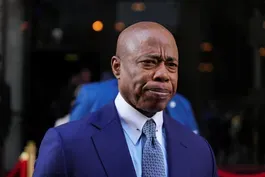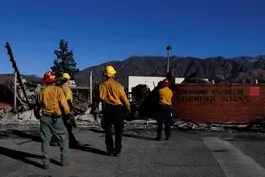
'Nickel Boys' director RaMell Ross on his distinct style
Clip: 2/11/2025 | 6m 46sVideo has Closed Captions
'Nickel Boys' director RaMell Ross on his distinct style and earning an Oscar nomination
It’s not every day that a director’s debut feature film earns an Academy Award nomination for Best Picture. But that’s what happened to RaMell Ross and the movie, “Nickel Boys." Senior arts correspondent Jeffrey Brown spoke with Ross about his distinctive style for our arts and culture series, CANVAS.
Major corporate funding for the PBS News Hour is provided by BDO, BNSF, Consumer Cellular, American Cruise Lines, and Raymond James. Funding for the PBS NewsHour Weekend is provided by...

'Nickel Boys' director RaMell Ross on his distinct style
Clip: 2/11/2025 | 6m 46sVideo has Closed Captions
It’s not every day that a director’s debut feature film earns an Academy Award nomination for Best Picture. But that’s what happened to RaMell Ross and the movie, “Nickel Boys." Senior arts correspondent Jeffrey Brown spoke with Ross about his distinctive style for our arts and culture series, CANVAS.
How to Watch PBS News Hour
PBS News Hour is available to stream on pbs.org and the free PBS App, available on iPhone, Apple TV, Android TV, Android smartphones, Amazon Fire TV, Amazon Fire Tablet, Roku, Samsung Smart TV, and Vizio.
Providing Support for PBS.org
Learn Moreabout PBS online sponsorshipAMNA NAWAZ: And now to our ongoing arts and culture series, Canvas.
It's not every day that a director's debut feature film earns an Academy Award nomination for best picture, but that's exactly what happened for RaMell Ross and the movie, "Nickel Boys."
Senior arts correspondent Jeffrey Brown spoke with Ross about his distinctive style.
ACTRESS: Elwood, look at me, son.
JEFFREY BROWN: In the film "Nickel Boys," it is we who are asked to look.
ACTRESS: He said what we have here is a classic miscarriage of justice.
JEFFREY BROWN: Forced to look at the world through the eyes of two young Black men living in an often brutal time and place in the Jim Crow south.
The camera perspective is from the point of view of the characters themselves, not us looking at them.
ACTOR: Where'd you come from?
JEFFREY BROWN: Director RaMell Ross.
RAMELL ROSS, Writer and Director: To do this means that you're aligning the subjectivity of the audience with the subjectivity of the character.
And that seems to be an undeniable way to get into the truth.
JEFFREY BROWN: The film is based on the 2019 Pulitzer Prize-winning novel, "The Nickel Boys" by Colson Whitehead, who based his fiction a grim reality, the real-life Dozier School for Boys, a reform school run by the state of Florida from 1900 to 2011, finally closed after hundreds of Black men came forward to tell of abuse, including floggings, forced labor, even killings.
And forensic anthropologists uncovered human remains in unmarked graves.
How did Ross see his role?
RAMELL ROSS: You have to give it to cinema and see what cinema wants to do with it, which is quite often very different from what language wants to do with it, or linguistic language.
JEFFREY BROWN: What cinema wants to do with it, that's an interesting term.
RAMELL ROSS: My goal is to listen to Colson's characters, with my co-writer of course, and figure out, for me, at least, what's the most visceral, the most open-ended, and the most unconscious way, ephemeral way, musical way to convey the information.
Sit and action.
JEFFREY BROWN: Working with co-writer Joslyn Barnes and cinematographer Jomo Fray, Ross gives cinematic life to two young men in 1960s Florida, with the civil rights movement in the background, rampant racism in their faces.
The unusual point-of-view perspective required creating special camera rigs placed on or around actors Brandon Wilson and Ethan Herisse to capture their lines of sight and movements, including the small, but important moments, what Ross calls the epic banal, that their eyes catch as they look around the room, a balloon hitting a ceiling fan, a TV report on space exploration.
RAMELL ROSS: It's the subjectivity of a young Black boy, and you know it's in a time period in which outside he's treated on the street differently from the relationship that he has now to the television and the technological advances, but yet it's just a moment in a boy's life.
JEFFREY BROWN: It's almost, says Ross, a way of giving cameras to Dozier's lost and dead themselves.
RAMELL ROSS: To be able to -- for boys whose lives were cut short, to give them the camera, to let them see, for the audience to see with them, to use the epic banal to give them moments of grace and moments of poetry was super meaningful, to point to the fact that their stories are less about their death and more about their life.
JEFFREY BROWN: If Ross is today obsessive about the camera, his first obsession was basketball.
A 6'6'' guard who played at Georgetown University and professionally abroad, he had dreams of the NBA.
But injuries forced him to change his life, first to still photography, then to film.
Are there similarities between basketball and filmmaking?
RAMELL ROSS: Yes, there's some very literal overlaps about the way that space is analyzed by the point of view, right?
Like, I played point guard.
You're dribbling down the floor, you're taking snapshots, you're using your body to control the space, it's about prediction, it's about time dilation.
JEFFREY BROWN: That's very point of view.
RAMELL ROSS: Very point of view.
JEFFREY BROWN: Dribbling down the court.
RAMELL ROSS: Yes, exactly.
Exactly.
It's about analysis.
In filmmaking, most often, you're considering this scene, but you're also allowing for the spontaneous to happen within a very controlled setting for a very specific outcome.
And so it's about space and spatial intelligence,essentially.
JEFFREY BROWN: So your obsessions of basketball and the camera, they have come together?
RAMELL ROSS: I mean, when I started making photographs, I was like, I found the perfect transition, yes.
JEFFREY BROWN: Ross' best known work to date was the 2018 documentary "Hale County This Morning, This Evening," which also made creative use of the different ways a camera can tell a story, using footage shot over several years of embedding himself in a rural Alabama community and also focused on young Black men.
In both films, he says, he's challenging the long history of how Blacks have been portrayed and thus seen.
RAMELL ROSS: I see myself telling the story of the production of Blackness.
JEFFREY BROWN: Production of Blackness.
RAMELL ROSS: Yes.
JEFFREY BROWN: Meaning?
RAMELL ROSS: The relationship between race and the camera.
I like to call the camera and the photograph the technology of racism, right?
Like, you have an idea that people are inferior, but how do you prove that?
How do you prove race?
You can't, because it's not true.
But what you can do is, you can photograph people with this nefarious idea in mind and then hand it to people that have no relationship to those folks.
You're incepting their brain with this idea and you're proving it with an image.
JEFFREY BROWN: You're in a sense subverting that image.
RAMELL ROSS: Yes, I think giving it more context.
I like to say I have never seen a Black man, but maybe I have only seen a Black man.
Blackness is a paradox that's reinforced by the camera.
It's both true and not true.
How do you deal with that?
To me, you dilute it.
You make sure that it's reflexive and you understand its depth.
You don't take it for granted.
JEFFREY BROWN: RaMell Ross' film "Nickel Boys" vies for two Oscars, best picture and best adapted screenplay on March 2.
For the "PBS News Hour," I'm Jeffrey Brown in New York.
AMNA NAWAZ: Another terrific conversation with Jeff Brown.
Corruption charges against New York Mayor Eric Adams dropped
Video has Closed Captions
Justice Department drops corruption charges against New York Mayor Eric Adams (5m 20s)
The long-term impact of Trump's cuts to medical research
Video has Closed Captions
The possible long-term impact of Trump's cuts to medical research funding (9m 31s)
News Wrap: American Marc Fogel released from Russia
Video has Closed Captions
News Wrap: American Marc Fogel released from Russian detention (7m)
Sen. Kim on why he says U.S. nearing constitutional crisis
Video has Closed Captions
Democratic Sen. Andy Kim explains why he thinks U.S. is nearing a constitutional crisis (6m 46s)
Students keep learning after wildfires destroy schools
Video has Closed Captions
Students and teachers find ways to keep learning after wildfires destroy schools (7m 3s)
Trump repeats Gaza idea as Israel threatens to end ceasefire
Video has Closed Captions
Trump doubles down on Gaza takeover idea as Israel threatens to restart war with Hamas (4m 7s)
UNAIDS says infections could soar if U.S. drops support
Video has Closed Captions
UN AIDS agency says HIV infections could soar worldwide if U.S. drops support (5m 54s)
Providing Support for PBS.org
Learn Moreabout PBS online sponsorshipMajor corporate funding for the PBS News Hour is provided by BDO, BNSF, Consumer Cellular, American Cruise Lines, and Raymond James. Funding for the PBS NewsHour Weekend is provided by...



















